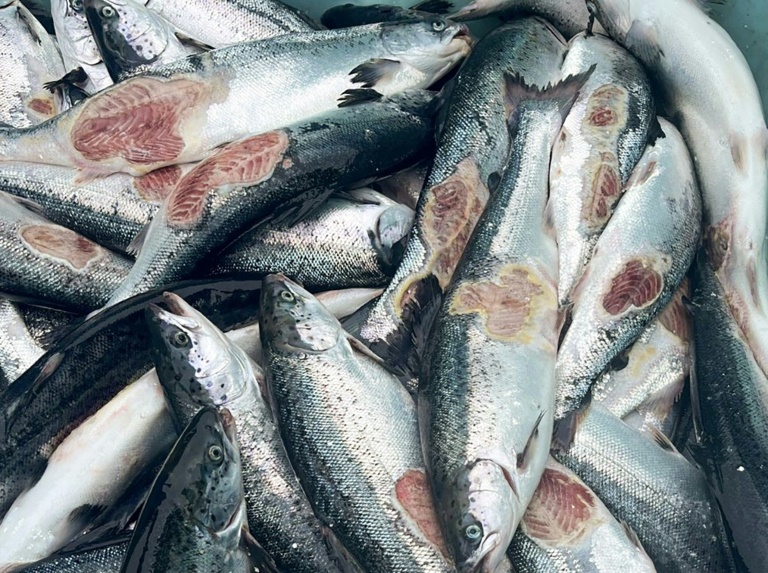Science
New Study Reveals Pharmaceutical Pollution Threatens Salmon Migration

Concerns over pharmaceutical pollution have escalated as a recent study highlights its harmful effects on salmon migration. Researchers from the Swedish University of Agricultural Sciences found that trace levels of the medication clobazam, commonly prescribed for sleep disorders, can significantly enhance the migration success of juvenile Atlantic salmon in Sweden. This alarming link underscores the potential ecological impact of pharmaceutical waste on vital aquatic species.
The study, published in the journal Science, reveals that juvenile salmon exposed to clobazam showed improved navigation through challenging environments, particularly when migrating from the River Dal to the Baltic Sea. As they passed through two hydropower dams, which typically act as barriers, the fish exhibited altered behavior, reducing their travel time significantly. This raises concerns about how pharmaceutical contaminants might modify natural behaviors critical for species survival.
Pharmaceutical pollution poses a growing challenge worldwide. Water released from wastewater treatment plants often contains pharmaceutical concentrations far exceeding those found in effluent from standard utility plants. This issue is exacerbated by the presence of various substances, including antimicrobials, muscle relaxants, and opioids, which not only harm ecosystems but also contribute to public health risks such as antimicrobial resistance.
To investigate the impact of these pollutants, the researchers employed slow-release pharmaceutical implants and animal-tracking transmitters to monitor juvenile salmon as they navigated their migration routes. The study also examined the effects of tramadol, a widely used opioid painkiller, alongside clobazam. Findings indicate that exposure to these drugs can lead to significant behavioral changes in salmon, which may have cascading effects on their population dynamics.
Dr. Marcus Michelangeli from Griffith University’s Australian Rivers Institute emphasized the growing concern regarding pharmaceutical pollutants, stating, “Over 900 different substances have now been detected in waterways around the world. Psychoactive substances like antidepressants and pain medications can significantly interfere with wildlife brain function and behavior.”
While the decline in Atlantic salmon populations has been primarily attributed to overfishing, habitat loss, and fragmentation, this study adds a new dimension to the factors influencing their survival. As salmon play a crucial role in aquatic ecosystems, any change in their behavior could have broader implications for surrounding wildlife communities.
Regulatory frameworks aimed at managing pharmaceutical waste exist, such as the requirements set forth by the U.S. Drug Enforcement Administration (DEA), which mandates that controlled substances be destroyed in a manner that renders them “non-retrievable.” Despite these regulations, challenges persist, particularly concerning illegal markets for pharmaceuticals that are not properly processed.
In light of these findings, researchers advocate for pharmaceutical companies to develop drugs that are more environmentally friendly, breaking down rapidly or becoming less harmful after use. Such initiatives could significantly mitigate the environmental impact of pharmaceutical pollution, promoting both public health and ecological integrity.
The research serves as a crucial reminder of the interconnectedness of human health, environmental stewardship, and wildlife conservation. As the world grapples with the consequences of pharmaceutical pollution, the health of species like the Atlantic salmon hangs in the balance.
-

 Education2 months ago
Education2 months agoBrandon University’s Failed $5 Million Project Sparks Oversight Review
-

 Lifestyle3 months ago
Lifestyle3 months agoWinnipeg Celebrates Culinary Creativity During Le Burger Week 2025
-

 Science3 months ago
Science3 months agoMicrosoft Confirms U.S. Law Overrules Canadian Data Sovereignty
-

 Health3 months ago
Health3 months agoMontreal’s Groupe Marcelle Leads Canadian Cosmetic Industry Growth
-

 Science3 months ago
Science3 months agoTech Innovator Amandipp Singh Transforms Hiring for Disabled
-

 Technology3 months ago
Technology3 months agoDragon Ball: Sparking! Zero Launching on Switch and Switch 2 This November
-

 Education3 months ago
Education3 months agoRed River College Launches New Programs to Address Industry Needs
-

 Technology3 months ago
Technology3 months agoGoogle Pixel 10 Pro Fold Specs Unveiled Ahead of Launch
-

 Technology1 month ago
Technology1 month agoDiscord Faces Serious Security Breach Affecting Millions
-

 Business2 months ago
Business2 months agoRocket Lab Reports Strong Q2 2025 Revenue Growth and Future Plans
-

 Science3 months ago
Science3 months agoChina’s Wukong Spacesuit Sets New Standard for AI in Space
-

 Education3 months ago
Education3 months agoAlberta Teachers’ Strike: Potential Impacts on Students and Families
-

 Technology3 months ago
Technology3 months agoWorld of Warcraft Players Buzz Over 19-Quest Bee Challenge
-

 Business3 months ago
Business3 months agoNew Estimates Reveal ChatGPT-5 Energy Use Could Soar
-

 Business3 months ago
Business3 months agoDawson City Residents Rally Around Buy Canadian Movement
-

 Education3 months ago
Education3 months agoNew SĆIȺNEW̱ SṮEȽIṮḴEȽ Elementary Opens in Langford for 2025/2026 Year
-

 Technology1 month ago
Technology1 month agoHuawei MatePad 12X Redefines Tablet Experience for Professionals
-

 Technology3 months ago
Technology3 months agoFuture Entertainment Launches DDoD with Gameplay Trailer Showcase
-

 Business3 months ago
Business3 months agoBNA Brewing to Open New Bowling Alley in Downtown Penticton
-

 Technology3 months ago
Technology3 months agoGlobal Launch of Ragnarok M: Classic Set for September 3, 2025
-

 Technology3 months ago
Technology3 months agoInnovative 140W GaN Travel Adapter Combines Power and Convenience
-

 Science3 months ago
Science3 months agoXi Labs Innovates with New AI Operating System Set for 2025 Launch
-

 Technology3 months ago
Technology3 months agoNew IDR01 Smart Ring Offers Advanced Sports Tracking for $169
-

 Technology3 months ago
Technology3 months agoDiscover the Relaxing Charm of Tiny Bookshop: A Cozy Gaming Escape










